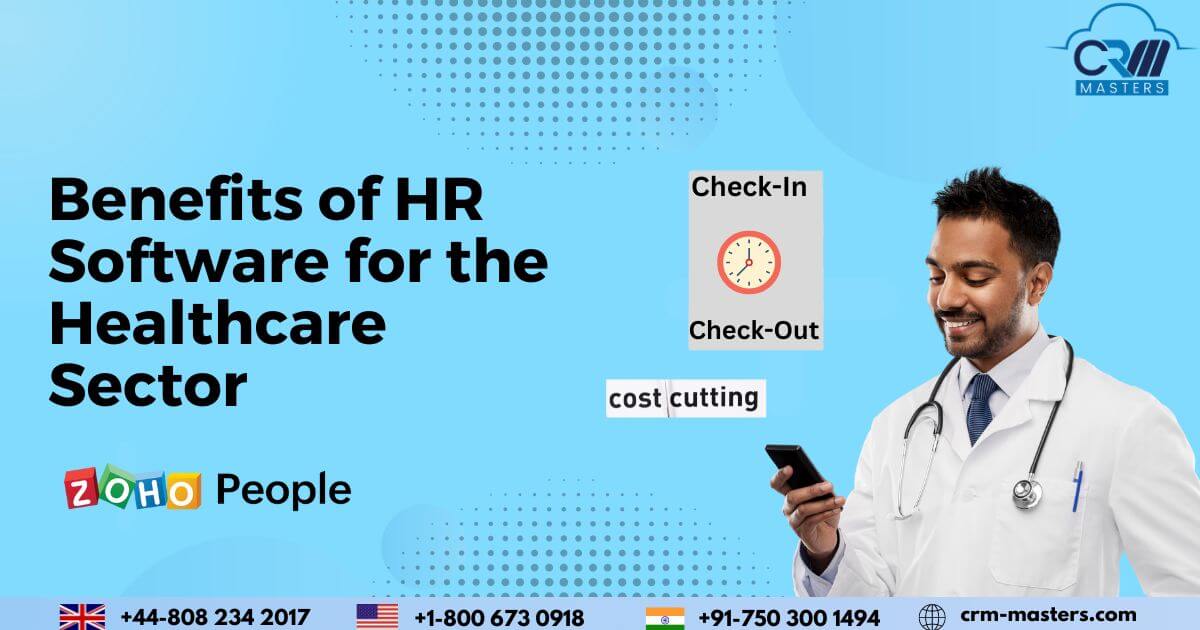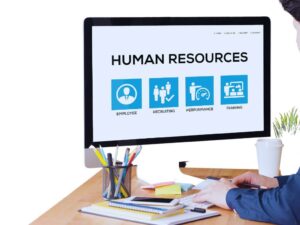
Benefits of HR Software for the Healthcare Sector
In the last few years, the use of HR software has grown dramatically in the healthcare industry. Taking care of the requirements of healthcare professionals is crucial. They are concerned with preserving the lives of others, after all. With efficient HR software, life would be simpler for both patients and healthcare workers.
Healthcare organizations encounter a number of difficulties, such as a high incidence of personnel turnover or regulatory compliance. When dealing with such circumstances, HR software is required to assist in reducing the strain. Automation of HR processes with the aid of HR software is urgently required. This blog covers every step of the process, from onboarding to offboarding.
What is HR Software?

Human Resource Software is a digital solution that helps HR professionals to manage individuals throughout the employment lifecycle by offering tools for streamlining administrative tasks, organizing personnel data, facilitating data sharing and collaboration, providing real-time feedback on critical issues, and creating an aesthetically pleasing and user-friendly online platform.
The Role of HR Software in Healthcare
By automating and streamlining different HR activities including hiring, onboarding, payroll, and performance management, HR software plays a crucial role in the healthcare industry. It ensures compliance with industry regulations and improves employee engagement and retention.
HR software also allows for efficient management of employee benefits and scheduling, leading to improved patient care and reduced administrative burden on healthcare providers. Additionally, it facilitates data analysis to help HR managers make informed decisions and improve overall organizational performance.
What are the Challenges in Healthcare?
For HR specialists, the healthcare sector’s extreme fragmentation poses several difficulties. Understanding these problems is essential to solving them and delivering better healthcare services.
The following are some of the main obstacles facing HR professionals in the healthcare industry:
Employee Turnover
One of the major problems now facing the healthcare industry is employee turnover. According to the National Healthcare Retention and RN Staffing Report, the hospital industry had a turnover rate of 17.8% in 2019. It could hurt both the quality of care given to patients and the financial health of your business. A better working environment for employees may lower the turnover rate.
Learning and Development Opportunities
Employees in the healthcare sector must continually improve their abilities to stay up with the changing demands of the sector. It is difficult to maintain high employee performance in HR departments to execute effective training programs. It can be a little intimidating to teach every single staff, including nurses, technicians, doctors, and more, according to the requirements of their position.
Compliance
It might be challenging to ensure compliance in the healthcare sector because HR workers deal with sensitive data. Also, they must adhere to the Affordable Care Act’s reporting obligations (ACA). HR professionals need to take care of a variety of items to maintain compliance, including ongoing certifications, background checks on personnel, and complicated licensing documents. This requires a significant amount of time and work.
Increase Employee Burnout
According to NEJM Catalyst research, 96% of healthcare professionals concur that staff burnout is one of the major problems facing the industry. For healthcare professionals, overwork, underappreciation, a lack of work-life balance, and a loss of autonomy are the leading causes of burnout. Employee burnout increases, which could impact the quality of patient care your firm provides.
The amount of strain facing HR specialists in the healthcare sector is proof of these difficulties. Using the technological tools that are now on the market is vital to lessen this burden. Almost every HR process, from onboarding to offboarding, can be simplified and more automated with HR software. It significantly enhances employee satisfaction and experience, which is crucial for healthcare workers today.
Let’s discuss how to overcome these challenges in the healthcare sector.
Also Read: How to Setup Zoho People in Easy Steps
Benefits of HR Software in the Healthcare Sector
Here are some of the benefits of using HR software in the healthcare sector:
Better Communication Among Employees
Patients need the best care and effective communication between staff members. For updates on a patient’s health, Doctors, specialists, technicians, and nurses must communicate with one another. In an emergency, having a short chat should be possible through an efficient communication channel.

Healthcare HR software makes this procedure simpler. With the help of HR software Information can be exchanged among employees by setting up internal group chats and live broadcasts.
Improved Employee Management
Given the high levels of stress present in the healthcare industry and the necessity to adhere to stringent standards, managing healthcare personnel can be difficult. By automating numerous typical HR operations like attendance monitoring, leave management, and performance reviews, HR software can assist healthcare firms in better managing their workforce. Managers and HR specialists may have more time to devote to important duties like managing and retaining employees as a result of this.
Compliance with Regulatory Requirements
Healthcare is a highly regulated industry, and organizations must comply with various laws and regulations. HR software can help healthcare organizations ensure compliance by automating compliance-related tasks such as tracking employee certificates and licenses, managing training programs, and conducting background checks.
Ease of Storing Records
There is a lot of patient and employee data present that needs to be handled carefully in the healthcare Industry. Sensitive information and situations requiring important decisions must remain private. Important documents and files can be shared online using HR software. It becomes simple to organize papers into categories and find them quickly when needed. It can be used to regulate staff attendance so that there are no inconsistencies, in addition to keeping medical data. When employing HR software, there is a lower chance of making mistakes.
Enhanced Employee Performance
Your staff must be capable of handling any circumstance with HR software. Everyone should be able to work more effectively. The many features of HR software, such as skillset matrices, multi-rater feedback, consistent reviews, etc., greatly aid in raising employee performance. Employee burnout can be reduced with improved performance. Employees enjoy using HR software for healthcare since it empowers them. You can save time and work this way.
Conclusion
HR software is important for healthcare organizations. HR software helps healthcare organizations to improve their overall performance. It also provides better patient care.
As a certified Zoho Implementation Partner, we are equipped with the expertise and resources to help businesses effectively integrate Zoho People service into their HR process. With our comprehensive understanding of the platform and its capabilities, we can guide our clients toward a seamless implementation that optimizes their HR management and improves their overall organizational performance.












